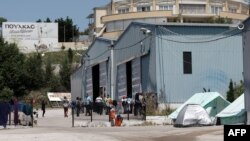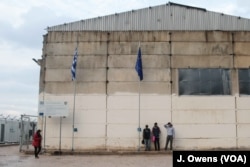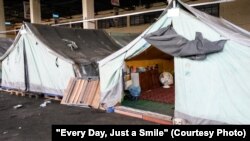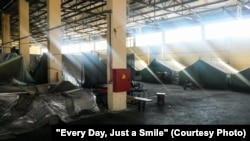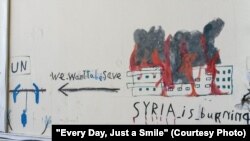Refugee advocates are calling attention to the poor treatment of refugees and migrants trapped on Greece’s islands, while in the mainland’s most notorious camp, conditions are equally grim.
November is expected to bring about the closure of Derveni, the only camp on mainland Greece where refugees and migrants are still living in tents, within the confines of a stripped-out factory on an industrial site near the northern city of Thessaloniki.
The end of Derveni — if it does happen — would come amid efforts to shift from crisis mode to a long term approach as the Greek state consolidates efforts to manage a new population of more than 50,000 people, many of whom Greek officials fear are likely to stay for years rather than months.
Amid an upturn in refugee arrivals into Greece and criticism of the state’s handling of the situation, Derveni’s beleaguered residents remain deeply uncertain about the future.
For some, the ‘End of the World’
“I’d thought things would get better but when I came here and experienced this, it felt like the end of the world,” said Jemal, a camp resident who asked to be identified by a name other than his real one.
Having fled his home in east Africa after speaking out against corruption. He remains too afraid to make his country of origin public. He crossed the Aegean on a dinghy from Turkey to the Greek island of Lesvos and spent four months there sleeping in a tent.
Around 13,500 migrants and refugees are currently stuck on the group of Greek islands that also include Chios, Samos, Kos and Leros.
They face possible deportation as they await the result of asylum applications more than a year and a half since an EU-Turkey deal promised, among other things, to return those whose applications were rejected back to Turkey, which in turn and in exchange for EU financial assistance would send "approved" refugees staying within its border on to European Union nations.
The general situation and poor living conditions in camps have provoked widespread criticism among humanitarian organizations, including a group of 19 that sent an open letter to Greek Prime Minister Alexis Tsiprias on October 23. The letter called on the Greek government to end its policy of keeping refugees and migrants contained on the islands and demanded that the government immediately transfer them to the mainland in order “to meet their protection needs.”
Jamal’s new reality on the mainland, however, was worse.
“I want to have a normal life, but here life is not normal,” he said.
Tough Conditions
Derveni was among the camps used by the government early last summer after the dispersal of thousands from an ad-hoc camp created at the crossing point into Macedonia when the country closed its borders.
More than 200 people are now in the camp, with some having arrived unregistered and on foot having taken the land route from Turkey into northern Greece, and others, like Jemal, transferred there from the Greek islands by the state.
In recent weeks, these transfers have stopped, though pressure to get refugees off the islands is once again growing with around 6,000 refugees arriving from Turkey last month — a sharp upturn on previous months.
In Derveni, with temperatures sweltering in the summer and freezing in the winter and with volunteers denied access to the camp, despondence has spread. Drug use, thefts, and fighting have become a part of camp life.
“People come here and they have stress, they have problems, and they feel angry,” said Mohammed, an Iranian who was transferred to the camp from the Greek Island of Samos. He requested his surname not be used, as is common among many refugees who often fear that revealing their true identity might jeopardize their chances for asylum or the security of their families back home.
Meanwhile a source who recently accessed the camp warned about the safety conditions, telling VOA “If you had a fire in one tent, in 10 minutes the whole warehouse would burn.”
“It’s not a place I’d wish on my worst enemy,” they added.
Yet to Close
Derveni is notorious among many humanitarian workers in Greece.
Liene Veide is a spokeswoman for the UNHCR, the U.N.’s refugee body, which has spoken out against relocating people from the islands to Derveni.
The camp was “not an appropriate place for any human being to live in, especially not long term,” said Veide.
Still, some turn up of their own accord, desperate for a place to live.
Ifigenia Anastasiadi, who until recently worked for a major NGO on the site, said the camp had become a “dump hole” for those whose nationalities meant they are less likely to be granted asylum.
In her time working there, Anastasiadi said she encountered a number of highly vulnerable residents, including those tortured in the countries they had fled.
Set to shut?
Gianluca Rocco, Greece’s chief of mission to the International Organization for Migration (IOM), which along with the Greek army oversees Derveni, said improvements had not been made because the camp had been expected to close sooner.
“We were told many times the camp would be closing,” said Rocco, “and sometimes when you’re trying to close a camp it creates a situation where you don’t want to get into investing in something that will close.”
Greek migration policy minister Giannis Mouzalas pledged the camp would shut by the end of last year before pushing the date back again, to May of 2017.
The ministry for migration policy has not responded to requests for comment.
UNHCR officials told VOA Derveni is among five camps in northern Greece to be closed by the end of November. Eight others closed earlier this year.
Rocco asserted that plans to close the camp were far more definite this time, adding it was very late to begin efforts to equip Derveni for winter.
Around 100 Derveni residents are vulnerable enough to fit the criteria to be moved into apartments, and some have already been moved as part of a wider UNHCR scheme.
The rest, meanwhile, are expected to be shifted to new camps in the coming weeks. After that, the future remains uncertain, especially for those who arrived on foot.
Having left the islands to be confronted with equally bad conditions in Derveni, Jemal remains cynical about the prospects of the camp shutdown and any potential benefits for him.
“I’m not expecting anything,” he said, “I’ve been disappointed by promises before, so why would I expect anything from anyone?”




